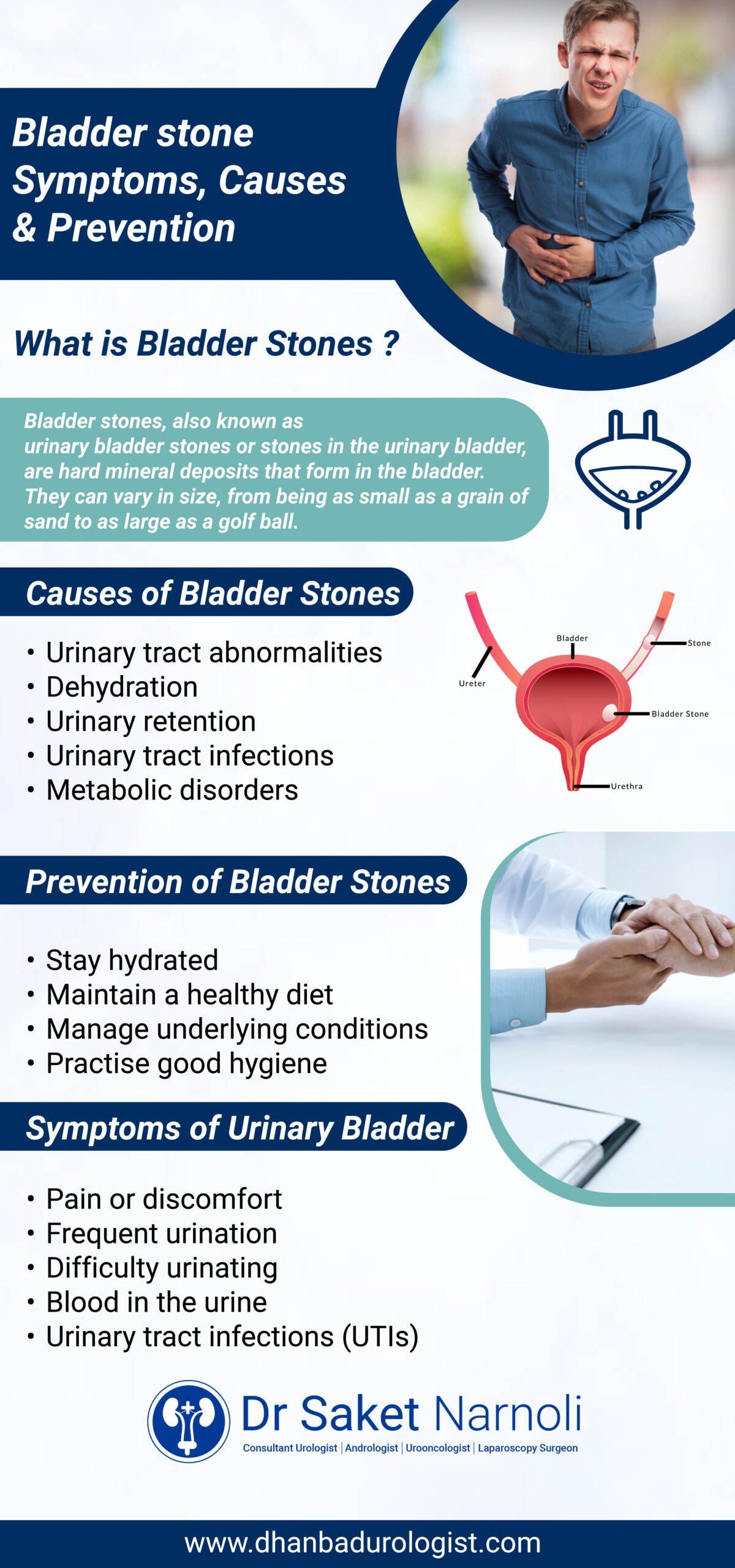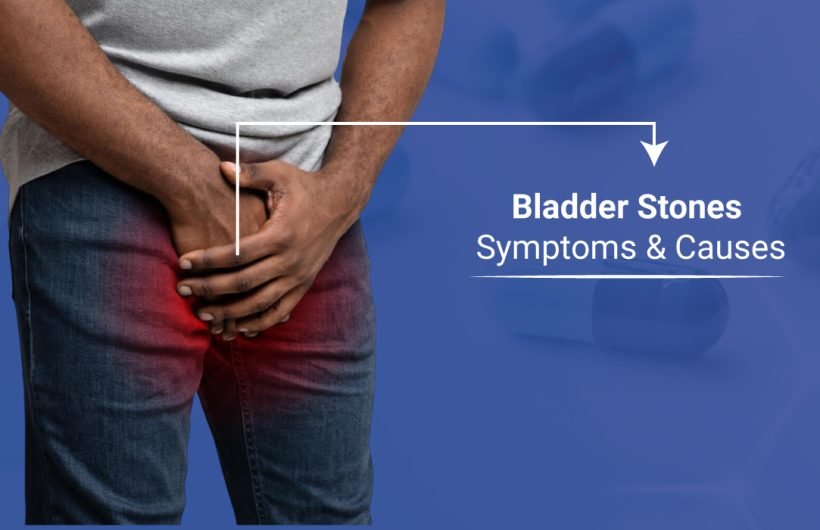Bladder stones, also known as urinary bladder stones or stones in the urinary bladder, are hard mineral deposits that form in the bladder. They can vary in size, from being as small as a grain of sand to as large as a golf ball. These stones can cause discomfort and complications if left untreated. In this comprehensive guide, we’ll delve into the symptoms, causes, and treatment options for bladder stones.

Symptoms of Urinary Bladder Stones:
When bladder stones are present, they can cause a variety of bladder stones symptoms these may include
- Pain or discomfort: Individuals with bladder stones may experience pain or discomfort in the lower abdomen, pelvis, or groin area. This discomfort can range from mild to severe and may worsen during urination.
- Frequent urination: Bladder stones can irritate the bladder, leading to an increased urge to urinate. However, despite the urge, only a small amount of urine may be passed.
- Difficulty urinating: Larger stone in urinary bladder can obstruct the flow of urine, making it difficult to empty the bladder completely. This can result in a weak urine stream or difficulty initiating urination.
- Blood in the urine: In some cases, bladder stones may cause blood to appear in the urine, a condition known as hematuria. The urine may appear pink, red, or brownish in color.
- Urinary tract infections (UTIs): Bladder stones can create an environment conducive to bacterial growth, increasing the risk of urinary tract infections. Symptoms of a UTI may include burning sensation during urination, cloudy or foul-smelling urine, and fever.
Causes of Bladder Stones:
Several factors can contribute to the formation of bladder stones causes, including:
- Urinary tract abnormalities: Structural abnormalities in the urinary tract, such as an enlarged prostate or bladder diverticula, can obstruct the normal flow of urine, leading to the formation of bladder stones.
- Dehydration: Insufficient fluid intake can result in concentrated urine, which increases the likelihood of mineral crystallisation and stone formation in the bladder.
- Urinary retention: Conditions that prevent the complete emptying of the bladder, such as bladder outlet obstruction or neurogenic bladder dysfunction, can predispose individuals to bladder stone formation.
- Urinary tract infections: Chronic urinary tract infections can promote the formation of bladder stones by providing a nidus for mineral deposition and stone growth.
- Metabolic disorders: Certain metabolic disorders, such as hypercalciuria (excessive calcium in the urine), hyperoxaluria (excessive oxalate in the urine), and cystinuria (excessive cystine in the urine), can increase the risk of stone formation which is the major bladder stones causes.
Options for Bladder Stone Treatment :
The bladder stone treatment depends on factors such as the size and composition of the stones, as well as the presence of symptoms. Treatment options may include:
- Watchful waiting: Small bladder stones that are asymptomatic may be monitored over time without intervention, especially if they are not causing any complications.
- Medication: Certain medications, such as alpha-blockers or urinary alkalizers, may be prescribed to help relax the bladder muscles or alter the pH of the urine, making it less conducive to stone formation .
- Fluid intake: Increasing fluid intake can help dilute the urine and prevent the formation of urinary bladder stones. Drinking plenty of water throughout the day is essential for maintaining urinary tract health.
- Extracorporeal shock wave lithotripsy (ESWL): ESWL is a non-invasive procedure that uses shock waves to break up bladder stones into smaller fragments, which can then be passed more easily during urination.
- Surgery: In cases where bladder stones are large or causing significant symptoms, surgical removal may be necessary. The bladder stone treatment in surgical options may include inserting a scope into the bladder to break up and remove the stones or open bladder stone surgery.
Prevention of Bladder Stones:
Taking proactive steps to prevent bladder stones can help reduce the risk of recurrence. Some preventive measures include:
- Stay hydrated: Drinking an adequate amount of water each day can help maintain urine dilution and prevent the concentration of minerals that can lead to stone formation.
- Maintain a healthy diet: Eating a balanced diet rich in fruits, vegetables, and whole grains while limiting the intake of foods high in oxalates, such as spinach, nuts, and chocolate, can help prevent certain types of bladder stones.
- Manage underlying conditions: Treating underlying conditions such as urinary tract infections, kidney stones, or metabolic disorders can help reduce the risk of bladder stone formation.
- Practice good hygiene: Practicing good hygiene habits, such as wiping from front to back after urination or bowel movements, can help prevent the spread of bacteria that can lead to urinary tract infections and bladder stones.
Conclusion
In conclusion, urinary bladder stones can cause discomfort and pain, but understanding the symptoms, causes, and treatment options can help individuals manage this condition effectively. If you suspect that you may have bladder stones, it’s important to seek medical attention to receive an accurate diagnosis and appropriate treatment. Additionally, taking preventive measures such as staying hydrated and maintaining a balanced diet can help reduce the risk of developing bladder stones in the first place.
When in doubt, seeking the advice of a medical professional guarantees a precise and prompt diagnosis, which in turn leads to the right course of treatment and the resolution of any underlying problems. Dr. Saket Narnoli, who is regarded as the Best Urologist in Dhanbad and Offers Excellent Urological Services, can be contacted to schedule an appointment. Urinary retention is typically successfully treated with a customized treatment plan and lifestyle changes.






